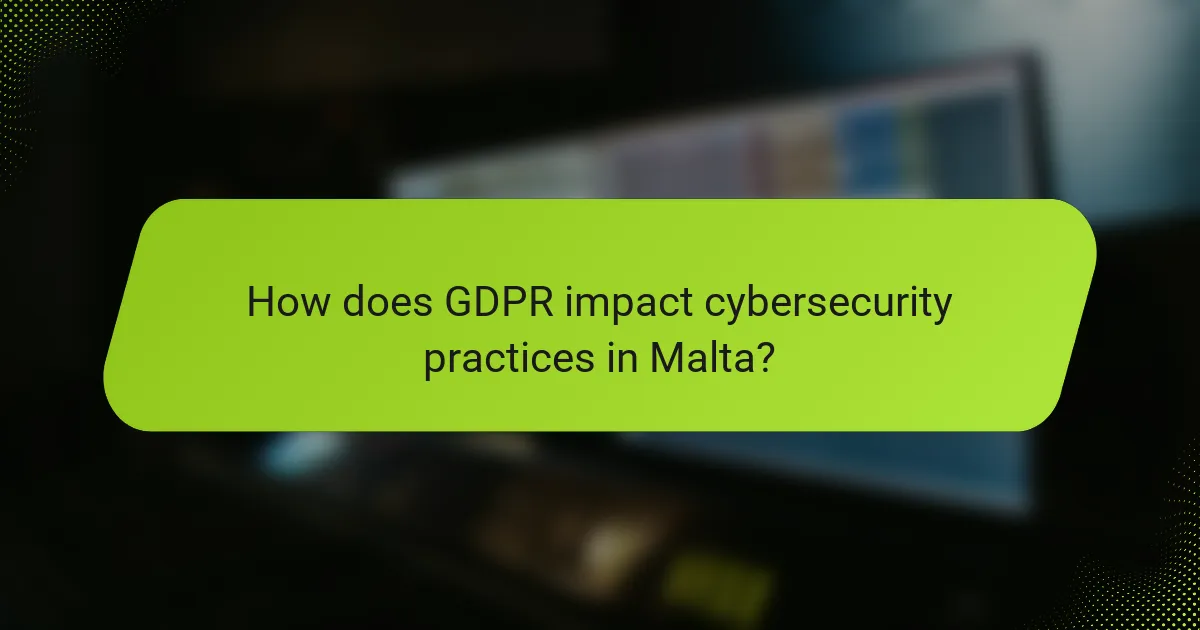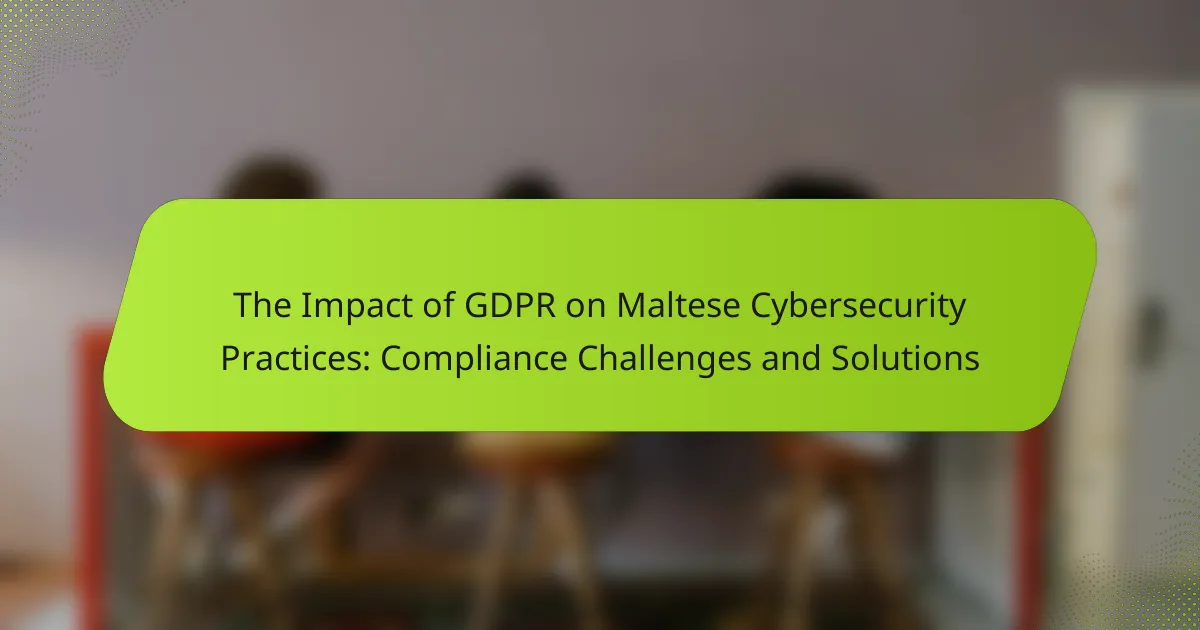
What is the GDPR and its relevance to Maltese cybersecurity practices?
The General Data Protection Regulation (GDPR) is a comprehensive data protection law in the European Union. It aims to enhance individuals’ control over their personal data. The GDPR mandates strict guidelines for data processing, storage, and sharing. Maltese cybersecurity practices must align with these regulations to ensure compliance. Non-compliance can lead to significant fines and reputational damage. The GDPR requires organizations to implement appropriate security measures to protect personal data. This includes risk assessments and data breach notifications. In Malta, adherence to GDPR is crucial for businesses handling personal information.
How does the GDPR define personal data and its protection?
The GDPR defines personal data as any information relating to an identified or identifiable natural person. This includes names, identification numbers, location data, and online identifiers. The regulation mandates that personal data must be processed lawfully, transparently, and for specific purposes. It emphasizes the need for adequate security measures to protect personal data from unauthorized access and breaches. Organizations must implement appropriate technical and organizational measures to ensure data protection. The GDPR also grants individuals rights regarding their personal data, including access, rectification, and erasure. Compliance with these provisions is essential for organizations handling personal data within the EU.
What are the key principles of data protection under GDPR?
The key principles of data protection under GDPR are lawfulness, fairness, and transparency. These principles require that personal data is processed legally, fairly, and in a transparent manner. Purpose limitation is another principle, which mandates that data must be collected for specified, legitimate purposes. Data minimization is essential, ensuring that only the necessary data is collected for processing. Accuracy is also crucial; data must be kept accurate and up to date. Storage limitation requires that data is retained only as long as necessary for its purpose. Lastly, integrity and confidentiality emphasize the need for secure processing to protect data against unauthorized access. These principles are foundational to GDPR compliance and ensure the protection of individuals’ personal data.
How does GDPR apply to organizations operating in Malta?
GDPR applies to organizations operating in Malta by requiring them to protect personal data of EU citizens. Organizations must implement data protection measures to comply with GDPR’s principles. They must ensure transparency in data processing and obtain consent for data collection. Organizations are also required to report data breaches to the relevant authorities within 72 hours. Failure to comply can result in significant fines, up to €20 million or 4% of annual global turnover. The Maltese Data Protection Authority oversees GDPR enforcement in Malta. Compliance with GDPR is essential for maintaining consumer trust and legal operation within the EU.
What are the compliance challenges faced by Maltese organizations?
Maltese organizations face significant compliance challenges primarily due to the General Data Protection Regulation (GDPR). These challenges include understanding complex regulations, which can be overwhelming for many businesses. Organizations often struggle with data mapping, essential for identifying personal data and its processing activities. Additionally, there is a lack of awareness and training among staff regarding GDPR requirements. This leads to improper handling of personal data and increased risk of non-compliance.
Moreover, the financial implications of compliance can be burdensome, particularly for small and medium enterprises. They may lack the resources needed to implement robust data protection measures. The evolving nature of regulations also poses a challenge, as organizations must stay updated with changes. Finally, the potential for heavy fines for non-compliance creates a significant pressure on Maltese organizations to adhere strictly to GDPR standards.
What specific GDPR requirements pose challenges for Maltese businesses?
Maltese businesses face challenges primarily with consent requirements and data subject rights under GDPR. Obtaining explicit consent from individuals can be complex. Businesses must ensure that consent is informed, specific, and freely given. This often requires changes to existing processes and systems.
Additionally, the right to access and the right to erasure present difficulties. Businesses must have mechanisms in place to respond to data access requests within one month. This can strain resources, especially for small and medium enterprises.
Data breach notification requirements also pose a challenge. Maltese businesses must report breaches to the supervisory authority within 72 hours. This tight timeframe necessitates robust incident response plans, which may not be fully developed in all organizations.
Finally, data protection impact assessments (DPIAs) are mandatory for high-risk processing. Conducting DPIAs can be resource-intensive and requires expertise that may be lacking in some Maltese businesses.
How do resource constraints affect compliance efforts in Malta?
Resource constraints significantly hinder compliance efforts in Malta. Limited financial resources restrict the ability of organizations to invest in necessary compliance technologies. This often leads to inadequate training for staff on GDPR requirements. Consequently, organizations may struggle to implement effective data protection measures. A survey by the Malta Chamber of Commerce found that 60% of businesses cited budget constraints as a major barrier to GDPR compliance. Additionally, smaller entities often lack the expertise to navigate complex regulations. This results in a higher risk of non-compliance and potential penalties. Overall, resource limitations create substantial challenges for maintaining GDPR standards in Malta.
What solutions can Maltese organizations implement to achieve compliance?
Maltese organizations can implement several solutions to achieve compliance with GDPR. First, they should conduct a thorough data audit to identify personal data processing activities. This audit helps organizations understand what data they hold and how it is used. Second, they need to appoint a Data Protection Officer (DPO) to oversee compliance efforts. The DPO ensures that the organization adheres to GDPR requirements. Third, organizations should provide staff training on data protection principles. Educated employees are crucial for maintaining compliance. Fourth, they must implement robust data security measures. These measures include encryption and access controls to protect personal data. Fifth, organizations should establish clear privacy policies and procedures. Transparent practices build trust and ensure compliance with GDPR transparency obligations. Finally, regular compliance reviews and updates are essential. This ongoing assessment helps organizations adapt to any regulatory changes.
How can organizations develop effective data protection policies?
Organizations can develop effective data protection policies by conducting a comprehensive risk assessment. This assessment identifies vulnerabilities and potential threats to sensitive data. Next, organizations should establish clear data handling procedures. These procedures must adhere to GDPR requirements, ensuring lawful data processing. Training employees on data protection best practices is essential. Regular training sessions help maintain awareness and compliance. Additionally, organizations should implement technical safeguards, such as encryption and access controls. These measures protect data from unauthorized access. Finally, organizations must regularly review and update their policies. Continuous evaluation ensures policies remain relevant and effective against emerging threats.
What role do training and awareness play in GDPR compliance?
Training and awareness are crucial for GDPR compliance. They ensure that employees understand data protection principles. Proper training helps staff identify personal data and recognize potential breaches. Awareness programs promote a culture of accountability regarding data handling. Organizations with trained employees are less likely to face violations. Studies show that companies investing in training report fewer data breaches. Effective training programs also keep staff updated on regulatory changes. This proactive approach minimizes risks associated with non-compliance.

How does GDPR impact cybersecurity practices in Malta?
GDPR significantly influences cybersecurity practices in Malta by enforcing strict data protection regulations. Organizations must implement robust security measures to protect personal data. This includes encryption, access controls, and regular security assessments. Non-compliance can lead to substantial fines, reaching up to €20 million or 4% of global turnover. Malta’s Data Protection Authority actively monitors compliance and offers guidance. Businesses must also ensure that third-party vendors comply with GDPR standards. Overall, GDPR drives a culture of accountability and proactive cybersecurity strategies in Malta.
What cybersecurity measures are required for GDPR compliance?
Organizations must implement specific cybersecurity measures for GDPR compliance. These include data encryption to protect personal data during storage and transmission. Regular security assessments are essential to identify vulnerabilities in systems. Access controls should be enforced to limit data access to authorized personnel only. Additionally, organizations must establish incident response plans to address data breaches promptly. Training employees on data protection practices is critical to ensure compliance. Maintaining detailed records of data processing activities is also required under GDPR. Lastly, organizations should conduct Data Protection Impact Assessments (DPIAs) for high-risk processing activities.
How can encryption enhance data protection under GDPR?
Encryption enhances data protection under GDPR by securing personal data from unauthorized access. It transforms readable data into an unreadable format, ensuring that only authorized users can access the information. This process helps organizations comply with GDPR’s principle of data minimization. By encrypting data, businesses reduce the risk of data breaches. In the event of a breach, encrypted data remains protected and unusable to attackers. GDPR Article 32 specifically encourages encryption as a security measure. Implementing encryption demonstrates a commitment to data protection and can mitigate potential fines. Overall, encryption is a vital tool for achieving GDPR compliance and safeguarding personal data.
What are the implications of data breaches on Maltese organizations?
Data breaches have significant implications for Maltese organizations. They can lead to financial losses due to fines, legal fees, and remediation costs. Organizations may face reputational damage, resulting in loss of customer trust. Data breaches can also lead to regulatory scrutiny under GDPR, with potential fines reaching up to 4% of annual global turnover. Additionally, breaches may disrupt business operations, causing downtime and affecting productivity. The Malta Communications Authority reported an increase in reported incidents, highlighting the urgency for improved cybersecurity measures. Organizations must invest in stronger data protection strategies to mitigate these risks.
How can organizations assess their current cybersecurity posture?
Organizations can assess their current cybersecurity posture through a comprehensive security audit. This audit should include evaluating existing security policies, procedures, and controls. Organizations must identify vulnerabilities in their systems and applications. Conducting [censured] testing can reveal potential weaknesses. Regular risk assessments help organizations understand their threat landscape. Monitoring security incidents and response effectiveness is also crucial. Compliance with regulations, such as GDPR, should be reviewed to ensure alignment. Utilizing frameworks like NIST or ISO 27001 can guide the assessment process.
What tools and frameworks can aid in cybersecurity assessments?
Common tools and frameworks for cybersecurity assessments include NIST Cybersecurity Framework, ISO/IEC 27001, and OWASP Top Ten. The NIST Cybersecurity Framework provides guidelines for managing cybersecurity risks. It emphasizes identifying, protecting, detecting, responding, and recovering from cyber threats. ISO/IEC 27001 offers a systematic approach to managing sensitive information. This framework helps organizations ensure data security and compliance. The OWASP Top Ten lists the most critical web application security risks. It serves as a guide for organizations to improve their security posture. These tools and frameworks are widely recognized for enhancing cybersecurity assessments. They are essential for organizations aiming to comply with regulations like GDPR.
How can organizations identify vulnerabilities in their systems?
Organizations can identify vulnerabilities in their systems through regular security assessments. These assessments include [censured] testing, which simulates attacks to find weaknesses. Vulnerability scanning tools can automate the detection of known vulnerabilities in software and configurations. Additionally, conducting risk assessments helps organizations understand potential threats and their impact. Keeping software and systems updated is crucial for minimizing vulnerabilities. Training employees on security awareness can also help identify and report potential issues. Compliance with frameworks like GDPR mandates regular audits, enhancing vulnerability identification. According to a study by the Ponemon Institute, organizations that conduct regular assessments experience 30% fewer security breaches.

What are the best practices for maintaining GDPR compliance in cybersecurity?
Implementing data minimization is a best practice for maintaining GDPR compliance in cybersecurity. Organizations should only collect and process personal data that is necessary for their specific purposes. Regularly conducting data audits helps identify unnecessary data and facilitates its removal.
Ensuring robust data security measures is essential. This includes encryption, access controls, and regular software updates to protect personal data from breaches. Staff training on data protection principles is crucial. Employees must understand their responsibilities under GDPR to avoid accidental violations.
Establishing clear data processing agreements with third parties is necessary. These agreements should outline responsibilities regarding data protection. Additionally, maintaining a record of processing activities is required by GDPR. This record should detail how personal data is handled within the organization.
Implementing a data breach response plan is vital. Organizations must be prepared to report breaches to authorities within 72 hours, as mandated by GDPR. Regularly reviewing and updating policies ensures ongoing compliance. Compliance should be integrated into the organization’s culture and practices.
How can organizations continuously monitor their compliance status?
Organizations can continuously monitor their compliance status by implementing automated compliance management systems. These systems track regulatory changes and assess adherence to standards in real-time. Regular audits and assessments should be conducted to identify compliance gaps. Utilizing compliance software can streamline this process and provide alerts for non-compliance issues. Employee training programs must be established to ensure staff understand compliance requirements. Additionally, organizations should maintain detailed records of compliance activities for transparency. Regular reporting and review processes can help in evaluating compliance effectiveness. Continuous monitoring is essential in adapting to evolving regulations, such as GDPR.
What metrics should be tracked to ensure ongoing GDPR compliance?
Key metrics to track for ongoing GDPR compliance include data breach incidents, consent management records, and data subject requests. Data breach incidents should be monitored to assess the frequency and impact of breaches. Consent management records must be maintained to ensure that consent is obtained and documented appropriately. Data subject requests metrics track the number of requests received and the response times to ensure compliance with the regulation. Additionally, training completion rates for employees on GDPR protocols should be recorded. Regular audits of data processing activities should also be conducted to identify compliance gaps. Monitoring these metrics helps organizations ensure they adhere to GDPR requirements and mitigate risks effectively.
How can regular audits improve compliance efforts?
Regular audits enhance compliance efforts by identifying gaps in adherence to regulations. They provide a systematic review of processes and controls. This process helps organizations align practices with legal requirements. Regular audits also foster a culture of accountability. They encourage continuous improvement in compliance strategies. According to a study by PwC, organizations that conduct regular audits are 50% more likely to meet compliance standards. This statistic underscores the effectiveness of audits in maintaining regulatory compliance.
What practical tips can Maltese organizations follow for effective GDPR compliance?
Maltese organizations can follow several practical tips for effective GDPR compliance. First, they should conduct a thorough data audit to identify personal data collection and processing activities. This helps in understanding what data is held and how it is used. Second, organizations must appoint a Data Protection Officer (DPO) if required, ensuring a dedicated individual oversees compliance efforts. Third, implementing data protection policies and procedures is essential. These should outline how personal data is handled and protected.
Fourth, organizations should provide GDPR training for employees. This raises awareness about data protection responsibilities among staff. Fifth, obtaining explicit consent from individuals before processing their data is crucial. Consent must be clear, informed, and revocable. Sixth, organizations should establish procedures for data breach notification. The GDPR mandates that breaches affecting personal data must be reported within 72 hours.
Seventh, ensuring data security measures are in place is vital. This includes encryption and access controls to safeguard personal data. Lastly, regular reviews and updates of compliance practices should be conducted. This helps organizations adapt to any changes in legislation or data processing activities. These steps are supported by the GDPR’s requirements for accountability and transparency in data handling.
What resources are available for training and support in GDPR compliance?
Resources available for training and support in GDPR compliance include online courses, workshops, and certification programs. Organizations like the International Association of Privacy Professionals (IAPP) offer comprehensive training resources. The European Data Protection Board (EDPB) provides guidelines and documentation for compliance. Local data protection authorities often host seminars and informational sessions. Additionally, consulting firms specialize in GDPR compliance training. These resources are designed to educate individuals and organizations on GDPR requirements and best practices.
How can organizations foster a culture of data protection among employees?
Organizations can foster a culture of data protection among employees by implementing comprehensive training programs. Regular training sessions educate employees about data protection policies and best practices. Clear communication of the importance of data security reinforces its value. Encouraging a reporting culture for data breaches promotes accountability. Providing access to resources and tools enhances employees’ ability to protect data. Leadership should model data protection behaviors to set an example. Regular audits and feedback mechanisms help identify areas for improvement. Research shows that organizations with strong data protection cultures experience fewer data breaches.
The main entity of this article is the General Data Protection Regulation (GDPR) and its implications for cybersecurity practices in Malta. The article outlines the relevance of GDPR in enhancing data protection, compliance challenges faced by Maltese organizations, and the necessary cybersecurity measures for adherence. Key principles of GDPR, such as data minimization and the need for explicit consent, are discussed alongside the financial and operational impacts of non-compliance. Additionally, the article presents practical solutions and best practices for organizations to achieve GDPR compliance, including staff training, data audits, and the implementation of robust security measures.
